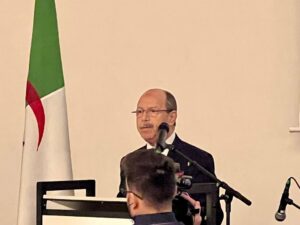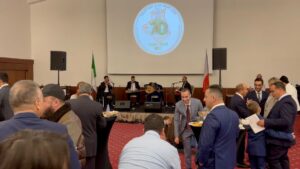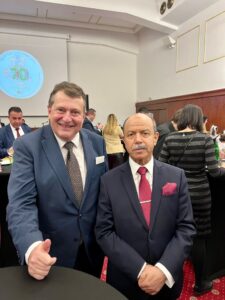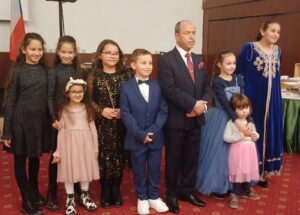- Hans Weber
- March 11, 2025
05.11.2024 Algeria’s National Day: A Celebration of Freedom and Independence
H.E. Belkacem Zeghmati invited in the first week of November the representatives of the diplomatic corps and Algerian people in the Czech Republic to celebrate together in Hotel International in Prague.
The First Deputy Minister of Foreign Affairs of the Czech Republic Mr. Jiří Kozák spoke on behalf of the Czech Republic
Each year on November 1st, Algeria celebrates its National Day, a date that holds great significance in the nation’s history. This day marks the beginning of the Algerian War of Independence, a pivotal moment when the courage and resilience of the Algerian people set in motion a series of events that would eventually lead to their freedom from French colonial rule.
Historical Context
For over 130 years, Algeria was under French colonial control, a period marked by significant cultural, political, and social changes enforced upon the native population. Despite the presence of a complex blend of cultures due to historical ties and influences, the indigenous Algerian population endured systemic discrimination and a loss of autonomy under colonial policies. By the mid-20th century, growing discontent and a strong sense of nationalism had reached a boiling point.
The Algerian War of Independence
On November 1, 1954, a coordinated series of attacks were launched by the National Liberation Front (FLN), signaling the start of the Algerian War of Independence. This was not just a battle for territory, but a profound struggle for identity, dignity, and justice. The war was brutal, lasting nearly eight years until a peace agreement was finally reached with the Evian Accords on March 18, 1962. On July 3, 1962, Algeria was officially recognized as an independent nation, and two days later, on July 5, independence was formally declared.
Celebrations and Commemorations
Algeria’s National Day is a time of celebration and remembrance. The entire nation comes together to honor the sacrifices made by countless individuals who fought for the country’s independence. Festivities can vary from large, grandiose parades in major cities, particularly in the capital Algiers, to smaller, community-centered events across the country. The Algerian flag—a symbol of freedom and sovereignty—is prominently displayed, and the national anthem is sung with pride.
Besides celebrations, November 1st is also a day of reflection and education. It serves as an opportunity for the younger generation to connect with their history and learn about the values of freedom and resilience that define their national identity. Schools often organize special programs that detail the events leading up to independence, and public speeches by political leaders and historical figures reiterate the importance of unity and progress.
Continuing Legacy
Algeria’s National Day is not only about looking back but also looking forward. Since gaining independence, Algeria has undertaken the complex task of nation-building, growing its economy, and addressing various social issues. While challenges remain, the spirit of November 1st inspires continuous efforts toward development and peace. The perseverance shown during the struggle for independence fuels the nation’s aspirations toward a prosperous future.
In conclusion, Algeria’s National Day is a powerful reminder of the strength found in unity, the power of determination, and the enduring hope for freedom. It is a day that celebrates not only a historical event but the principles that continue to guide the nation. With each passing year, November 1st deepens its meaning as a firm testament to the unyielding spirit of the Algerian people.
Recent posts
See AllPrague Forum Membership
Join us
Be part of building bridges and channels to engage all the international key voices and decision makers living in the Czech Republic.
Become a member




